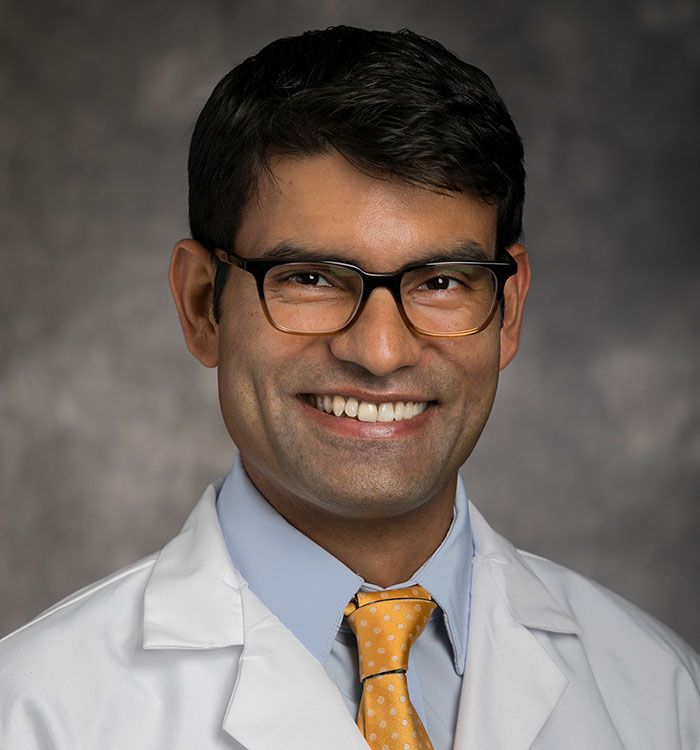In the Spotlight: New UH Urologist Shubham Gupta, MD, FACS
November 11, 2019
Offering transformative urologic reconstruction for underserved populations
innovations in Urology | Fall 2019
 Shubham Gupta, MD
Shubham Gupta, MD
What started as a personal challenge to master the technically demanding work of urologic reconstruction has led to a passion for helping underserved patient populations. Shubham Gupta, MD, FACS, Director of Gender and Sexual Diversity Services (GSDS) and Division Chief of Reconstructive Urology at University Hospitals Urology Institute, and Associate Professor at Case Western Reserve University School of Medicine, specializes in reconstructive surgery for cancer survivors. He is also establishing Ohio’s first comprehensive, multidisciplinary gender affirmation program.
Dr. Gupta recently joined UH Urology Institute. “I started conversing with [UH Urology Institute Chairman] Dr. [Lee] Ponsky last fall and was impressed with the capacity here to make a meaningful impact,” he says. “My long-term vision for reconstructive urology and transgender care aligned well with the leaders I met.”
Prior to coming to Cleveland, Dr. Gupta served as Chief of the Division of Reconstructive Urology for Chandler Medical Center at the University of Kentucky, where he was recognized two consecutive years for excellence in teaching. Before that, he completed a prestigious fellowship in reconstructive urology and genitourinary cancer survivorship at Duke University. His expertise includes many nuanced and challenging aspects of genitourinary reconstruction and urologic surgery.
GENDER AFFIRMATION CARE
The GSDS program at University Hospitals strives to eliminate health disparities experienced by the LGBTQIA+ community.
Working in collaboration with plastic surgeons at University Hospitals Cleveland Medical Center and Clinical Assistant Professor of Surgery at the School of Medicine, Dr. Gupta is offering male-to-female and female-to-male gender affirmation surgeries. “These are complete reconstructions, including vaginoplasties, phalloplasties and metoidoplasties inter alia,” says Dr. Gupta. “The procedures require extensive preoperative planning and meticulous surgical technique.”
However, Dr. Gupta emphasizes that meeting the needs of transgender patients goes beyond the surgical aspect. Comprehensive GSDS services will address the physical, mental, social and emotional well-being of individuals seeking care, including hormone therapy, psychosocial support and patient advocacy.
“Anyone who has a need for our services can pick up the phone and dial 216-286-LGBT (216-286-5428),” says Dr. Gupta. “A patient care navigator will be available to direct the caller to the appropriate department within UH.”
In Ohio, it is estimated that approximately 40,000 people identify as transgender. They too often lack access to culturally competent providers and face isolating barriers due to social stigma, discrimination and denied access to basic human rights. “Who we are as a society is reflected in how we treat the most vulnerable among us,” says Dr. Gupta, paraphrasing Indian leader Mahatma Gandhi. “I sincerely believe that, and my colleagues at UH believe it too.”
Additionally, from a resource utilization perspective, providing quality, compassionate gender-affirming care enables patients to move from often living in the shadows to participating in society and contributing to the economy. “I’ve seen too many botched surgeries, performed under terrible conditions,” says Dr. Gupta. “Globally, healthcare systems are footing the bill because of the complications individuals experience. We have the capacity to offer these services to our patients and achieve much better outcomes.”
CANCER SURVIVORSHIP CARE
Dr. Gupta also specializes in reconstruction for patients who experience post-cancer care complications. “Cancer is not just a snapshot,” says Dr. Gupta. “It changes who people are and continues to affect the rest of their lives.”
Genitourinary sequelae from cancer surgery and radiation can manifest even years later. Dr. Gupta’s goals for cancer survivorship services at UH Urology Institute include providing multidisciplinary care that involves a combination of medical, surgical and behavioral experts. “There are close to 20 million cancer survivors in the U.S.,” he says “Who will care for these patients and address their ongoing needs?”
Cancer treatment-related genitourinary complications that Dr. Gupta treats include:
- Urethral stricture
- Post-prostatectomy complications
- Rectourethral fistula
- Devastated bladder
- Bladder neck contracture
- Incontinence
- Sexual dysfunction
PROVIDING HOPE THROUGH TRANSFORMATIVE CARE
As both the nascent gender affirmation and cancer survivorship programs continue to develop at UH Urology Institute, the focus remains on improving quality of life through transformative care. “These are challenging patient populations, but when we are able to help these individuals, it is extremely gratifying,” says Dr. Gupta. “We are shining a light on University Hospitals because few places are offering these services.”
Dr. Gupta is seeing patients at UH Cleveland Medical Center and University Hospitals Brainard Medical Building. For more information or to refer a patient, please call 216-553-1595 or email Shubham.Gupta@UHhospitals.org.


